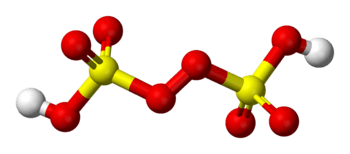Hugh Marshall
Professor Hugh Marshall FRS FRSE FCS (7 January 1868-5 September 1913) was a Scottish chemist who discovered persulphates in 1891.[1] He was the inventor of Marshall's acid.[2] In 1902 he proposed the modified sign of equality which became standard in chemistry to represent dynamic equilibrium[3].

Life
He was born in Edinburgh on 7 January 1868 and educated at Moray House Normal School. He studied science at the University of Edinburgh and graduated with a BSc in 1886 and gained a doctorate (DSc) in 1888.
In 1894 he began lecturing in mineralogy and crystallography at the University of Edinburgh, changing to chemistry in 1902 and moving to Dundee University College (which was later to become the University of Dundee but was then a constituent college of the University of St Andrews) as Professor of Chemistry in 1908.
In 1888 he was elected a Fellow of the Royal Society of Edinburgh. His proposers were Alexander Crum Brown, Leonard Dobbin, John M. MacFarlane, and John Chemist. He won the Society's Keith Prize for the period 1899-1901. He was elected a Fellow of the Royal Society of London in 1904.[4]
He died in London on 5 September 1913 aged 45. He did not marry and had no children.
Publications
- Salts and Their Reactions (co-written with Leonard Dobbin)
- Hugh Marshall (1891). "LXXIV. Contributions from the Chemical Laboratory of the University of Edinburgh. No. V. The trisulphates" (PDF). J. Chem. Soc., Trans. 59: 771–786. doi:10.1039/CT8915900771.
- Marshall, Hugh (1902). "Suggested Modifications of the Sign of Equality for Use in Chemical Notation". Proceedings of the Royal Society of Edinburgh. 24: 85–87. doi:10.1017/S0370164600007720. Retrieved 9 November 2018.
References
- Dobbin, Leonard (1913-10-01). "Prof. Hugh Marshall, F.R.S". Nature. 92 (2292): 138–139. doi:10.1038/092138a0. ISSN 1476-4687.
- Senning, Alexander (2006-10-30). Elsevier's Dictionary of Chemoetymology: The Whys and Whences of Chemical Nomenclature and Terminology. ISBN 9780080488813.
- Marshall, Hugh (1902). "Suggested Modifications of the Sign of Equality for Use in Chemical Notation". Proceedings of the Royal Society of Edinburgh. 24: 85–87. doi:10.1017/S0370164600007720. Retrieved 9 November 2018.
- Biographical Index of Former Fellows of the Royal Society of Edinburgh 1783–2002 (PDF). The Royal Society of Edinburgh. July 2006. ISBN 0 902 198 84 X.